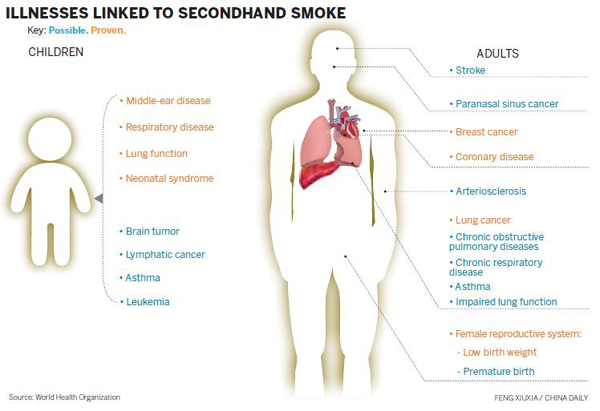
To reverse that situation, the country needs to take urgent action to meet its obligations under the WHO's Framework Convention on Tobacco Control, Huang said.
"The issue and implementation of the December notice is an important step in the process. Tobacco is already taking a devastating toll on the health service, the economy and society. If we don't act now, the 1 million-plus deaths that result from smoking-related diseases every year will rise to 3 million by 2050," he added.
Shin urged the introduction and implementation of a national smoke-free law to cover China's 1.3 billion citizens. "Achieving that would be a watershed moment for tobacco control, not only for China but for the entire world," he said.
Promising feedback
Wang Longde, a former vice-minister of health who has been an NPC deputy for six years, regularly proposed tougher controls on tobacco-related products at the annual meetings but eventually became discouraged.
"The government departments' responses to my previous proposals didn't satisfy me," he said. "The replies were always along the lines of: 'We are deeply concerned and more research work is planned'."
Wang also served as director of the Chinese Preventive Medicine Association, one of the NGOs involved in the letter requesting a smoke-free two sessions. "The feedback this time is promising, even without any specific measures," he said. "I have seen fewer deputies smoking in public at this year's meetings, especially after the milestone notice issued on Dec 29 by the CPC's Central Committee and the General Office of the State Council, that required officials to take the lead in making public areas smoke-free," he said.
Huang believes that the December notice - which stipulated that smoking would be prohibited at all public activities held by the government or the Party - was the top leadership's strongest ever commitment to tobacco control.
While shooting a public service announcement produced by China Daily, he joined a number of political advisers and deputies to chant the slogan, "A smoke-free two sessions and a healthy China."
"That's just the first step. A smoke-free China is the ultimate goal," Wang said, adding that the health risks associated with tobacco, scientifically proven worldwide, have gradually been accepted by the nation's top decision-makers.
Anthony Wu, a CPPCC member who was until recently chairman of the Hong Kong Hospital Authority, said that in his experience the situation regarding tobacco control on the mainland has improved over the years.
"When I first became a political adviser in 1998, some members smoked openly at the meetings," he recalled.
Last year, Wu joined a group of political advisers, most of them from the CPPCC's Medical Specialty Committee, to write a joint letter to the organizers of this year's two sessions requesting the removal of block ash buckets from the east gate of the Great Hall of the People. "To my surprise, they heeded our suggestion immediately and took away the buckets," he said.
Raising awareness
Although the anti-smoking drive is making headlines at this year's two sessions, the efforts to impose a ban at the Great Hall of the People began in 1988 during the first session of the 7th NPC. A delegate from Guangzhou, the Cantonese opera singer Hong Xiannu, asked China's then-leader Deng Xiaoping to stub out his cigarette. Deng politely complied with Hong's request and shortly afterward the ashtrays were removed from the Great Hall of the People.
In 1996, the then-premier Li Peng banned the sale of cigarettes in the iconic building, thus bringing into effect Beijing's first ban on smoking in public places on May 15 that year.
